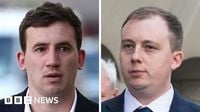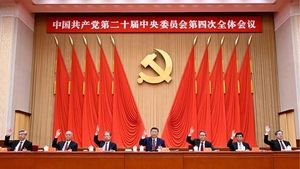Senior British officials are set to appear before Parliament on Monday, October 27, 2025, to answer questions about the dramatic collapse of the high-profile China spy trial—a case that has ignited fierce debate about national security, government transparency, and the evolving relationship between the UK and China. The Joint Committee on the National Security Strategy will hold its first public evidence session into why charges against Christopher Cash and Christopher Berry, accused under the Official Secrets Act, were dropped after months of anticipation and controversy. Both men have consistently denied any wrongdoing.
At the center of the inquiry are several top government figures, including Stephen Parkinson, the Director of Public Prosecutions; Matt Collins, the Deputy National Security Adviser; Richard Hermer, the Attorney General; Darren Jones, the Chief Secretary to the Prime Minister; and Sir Chris Wormald, the Cabinet Secretary. Notably absent from the public session will be National Security Adviser Jonathan Powell, a close ally of Prime Minister Sir Keir Starmer, who is expected to give evidence privately at a later date.
According to BBC, the trial’s collapse has been attributed to the government’s refusal to describe China as a threat to national security—an omission that proved critical under the requirements of the Official Secrets Act 1911. This legislation stipulates that those accused of spying can only be prosecuted if the information they allegedly passed on was useful to an “enemy.” In a letter to MPs, Deputy National Security Adviser Matt Collins explained that he removed the term “enemy” from the final draft of his witness statement because it did not reflect government policy at the time. Collins wrote, “Drafts of a statement provided to DNSA included the term ‘enemy’ but he removed this term from the final draft as it did not reflect government policy.”
Collins’ first witness statement, submitted on December 22, 2023, described China as an “epoch-defining challenge,” echoing language from the Conservative government’s Integrated Review Refresh 2023. However, as the case evolved and Labour took office, Collins’ subsequent statements referenced the UK’s “positive” relationship with Beijing and mirrored the 2024 Labour manifesto. Collins emphasized in his letter that he amended the statement “to ensure factual accuracy and that it was in line with current government policy.” He also informed police and then-Prime Minister Rishi Sunak in December 2023 that he could not label China an “enemy.”
The shifting political landscape has only intensified the finger-pointing. Conservative leader Kemi Badenoch has accused the Labour government of allowing the case to collapse by not designating China as a national security threat, arguing, “the point is that the alleged spies were charged under a Conservative government and they were let off under a Labour government.” Badenoch also claimed she had labeled China as a “threat to our economy” while in office, though the legal bar for prosecution was not met under either administration.
The government, for its part, has pushed back firmly against allegations of political interference. Downing Street officials maintain that no ministers or special advisers were involved in drafting or approving the witness statements and that the process was strictly in line with the government’s position at the time of the alleged offenses. Darren Jones, the Chief Secretary to the Prime Minister, reiterated in a letter to the committee that “no special advisers played any role in shaping witness statements either—a key point given suspicions about Powell’s role in China policy.” The government has also stressed that it would have been inappropriate to intervene in the case and that ministers are “frustrated” the prosecution did not continue.
Yet, the timeline of who knew what—and when—remains murky. Attorney General Richard Hermer revealed he was informed on September 3, 2025, that prosecutors were dropping the case but was asked by the Director of Public Prosecutions not to alert other ministers, including the prime minister. Hermer received routine updates in August indicating the trial was expected to proceed, only to learn at a September 3 meeting with DPP Parkinson that the decision had changed. Hermer stated, “there is nothing unusual in the law officers being requested to keep information about individual prosecution decisions confidential even from senior colleagues.”
Meanwhile, Sir Chris Wormald, appointed Cabinet Secretary by Prime Minister Starmer in December 2024, is expected to be grilled about his role in the process. According to BBC, Wormald attended a pivotal meeting of senior civil servants on September 1, 2025, led by National Security Adviser Jonathan Powell. This meeting has become a flashpoint, with opposition politicians arguing it was crucial to the case’s collapse. Wormald, however, defended the meeting as “entirely appropriate and what you would expect in a case such as this,” adding he was “satisfied” that there was “nothing unusual about the involvement of ministers, special advisors or civil servants in this case.”
The role of Jonathan Powell, the Prime Minister’s close confidant and a rare political appointee to the National Security Adviser post, has also come under scrutiny. Powell has met the Chinese foreign minister at least twice and hosted a senior member of the Chinese politburo earlier this year—meetings not announced by Downing Street but revealed through Chinese government documents. While some have accused Powell of orchestrating a softer approach to China, government figures insist he did not direct officials to avoid labeling China a threat to national security. Powell’s private evidence session is eagerly anticipated.
For its part, the Crown Prosecution Service (CPS), led by Stephen Parkinson, maintains that there was enough evidence to charge Cash and Berry in April 2024, but the case fell apart after a separate spying trial altered the legal interpretation of what constitutes a threat. Parkinson has said he was forced to seek further evidence from the government, only to find that officials would not describe China as a national security threat. Legal experts have questioned whether the CPS could have proceeded without this explicit designation, and Parkinson is likely to face tough questions about the decision-making process when he appears before MPs.
The Joint Committee’s inquiry, launched in mid-October 2025, has already published evidence from Collins and others, shining a spotlight on the complex interplay between legal requirements, shifting government policies, and the realities of international diplomacy. The Conservative leadership has argued that Labour’s ambition for closer economic ties with China influenced the trial’s outcome, a charge Labour officials strongly deny. The Liberal Democrats, meanwhile, have called out what they describe as the Conservatives’ “faux outrage,” urging party leaders to answer the same tough questions they are posing to others.
As the public hearing approaches, the focus is now on whether the government’s handling of the case reflected a lack of curiosity or grip on a matter of major national importance, or whether the collapse was an inevitable result of evolving legal interpretations and a cautious approach to international relations. The testimony of senior officials promises to shed light on the opaque world of national security prosecutions—and may well shape the future of how the UK balances its legal, political, and diplomatic priorities in a rapidly changing world.
With the stakes high and the political consequences far from settled, all eyes will be on Parliament this Monday as the story of the collapsed China spy trial continues to unfold.




